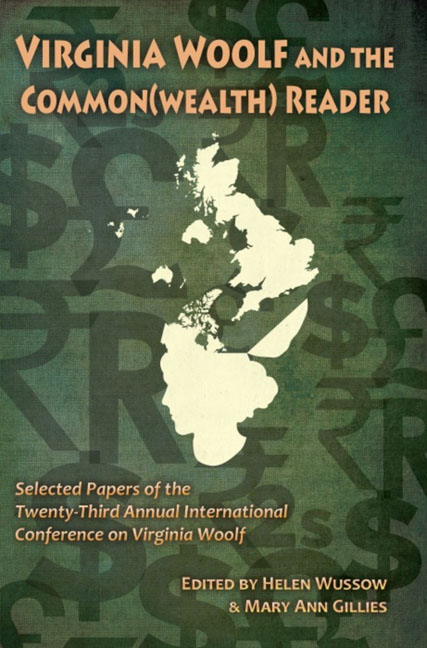Book contents
- Frontmatter
- Contents
- Introduction to Virginia Woolf and the Common(wealth) Reader
- Acknowledgments
- List of Abbreviations
- Invocations
- Networks of Affiliation: Foundations and Friends
- Education and Empire in Victorian Bloomsbury
- Synthesizing Civilizations: Leonard Woolf, the League of Nations, and the Inverse of Imperialism, 1928–1933
- James Stephen's Anti-Slavery Politics: A Woolfian Inheritance
- Networks of Empire: Virginia Woolf and the Travel Writing of Emily Eden
- Of Scrapbooks, War, and Newspapers: Leslie Stephen's Legacy
- Leslie Stephen's Science of (Ecological) Ethics
- “The Death of a Beautiful Man”: Rupert Brooke in Memory and Imagination
- Leonard Woolf and the Ceylon Civil Service: “I had come to dislike imperialism”
- Virginia Woolf in the British Commonwealth
- Woolf and the Commonwealth
- 1930s Onwards
- Woolf Beyond the Book
- Notes on Contributors
- Conference Program
James Stephen's Anti-Slavery Politics: A Woolfian Inheritance
from Networks of Affiliation: Foundations and Friends
- Frontmatter
- Contents
- Introduction to Virginia Woolf and the Common(wealth) Reader
- Acknowledgments
- List of Abbreviations
- Invocations
- Networks of Affiliation: Foundations and Friends
- Education and Empire in Victorian Bloomsbury
- Synthesizing Civilizations: Leonard Woolf, the League of Nations, and the Inverse of Imperialism, 1928–1933
- James Stephen's Anti-Slavery Politics: A Woolfian Inheritance
- Networks of Empire: Virginia Woolf and the Travel Writing of Emily Eden
- Of Scrapbooks, War, and Newspapers: Leslie Stephen's Legacy
- Leslie Stephen's Science of (Ecological) Ethics
- “The Death of a Beautiful Man”: Rupert Brooke in Memory and Imagination
- Leonard Woolf and the Ceylon Civil Service: “I had come to dislike imperialism”
- Virginia Woolf in the British Commonwealth
- Woolf and the Commonwealth
- 1930s Onwards
- Woolf Beyond the Book
- Notes on Contributors
- Conference Program
Summary
Many biographies of Virginia Woolf incorporate, at some point, a genealogy of her male Stephen ancestors: a succession of writers, lawyers, politicians, churchmen, and academics. If scholars accord them any relevance at all, it is often to follow Jane Marcus by classifying them as a patriarchal force that Woolf rejected. This paper seeks to uncover a more subtle and complex aspect of this legacy by focusing on a figure who does not feature in Marcus's genealogy: Woolf's great-grandfather, James (Jem) Stephen (1758-1832), MP and lawyer, Clapham Sect Evangelical and vociferous anti-slavery campaigner. While it would be easy to dismiss this Stephen as yet another representative of the patriarchal establishment that Woolf pitted herself against, his legacy is more complex than this for, despite his involvement in key pillars of patriarchy (law, religion and politics), his position was ambivalent and liminal.
James Stephen was not born into privilege, for his father, also James, was heavily in debt and the family spent time in prison because of it. As a result, Jem's education was severely disrupted for he was enrolled at several schools before financial difficulties forced him to leave. He started training for law in 1775, enrolling at Lincoln's Inn and studying at Marischal College, Aberdeen, but his studies were halted by financial problems after two years. He did not complete his legal training until 1782, having inherited money from his uncle William Stephen, a doctor and slave-trader based in St Kitts.
Additionally, as a young man, James Stephen did not exhibit the work ethic and puritan morals of the Evangelical he would become, because he “made no serious attempt to get into practice” after qualifying (Memoirs 415). Instead, he continued to study, he began to assemble a library of law books and conducted relationships with both “Maria Rivers” and Anna Stent. He fathered a child with “Maria” but then married Anna in June 1783. This “truly embarrassing and painful dilemma” (Memoirs 415), and the need to provide for his family, finally prompted him to take up a longstanding opportunity to use family connections to go to the West Indies and set up a legal practice. He therefore sailed alone to join his brother in St Kitts in the October of that year.
- Type
- Chapter
- Information
- Virginia Woolf and the Common(wealth) Reader , pp. 27 - 32Publisher: Liverpool University PressPrint publication year: 2014

